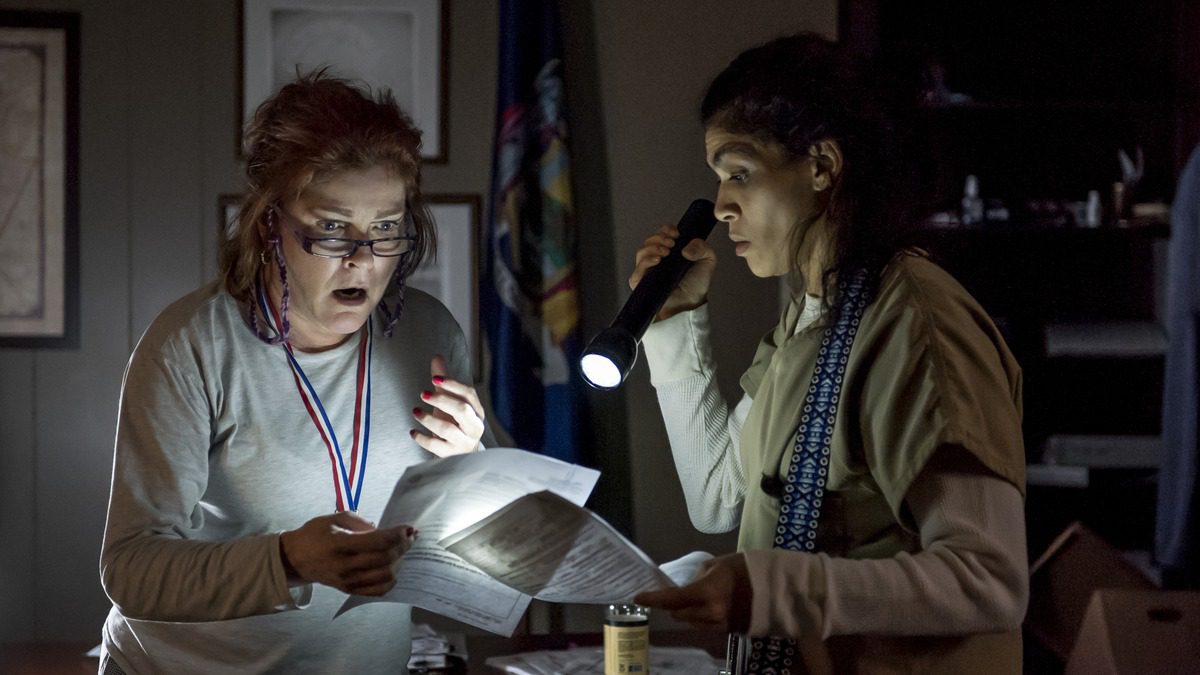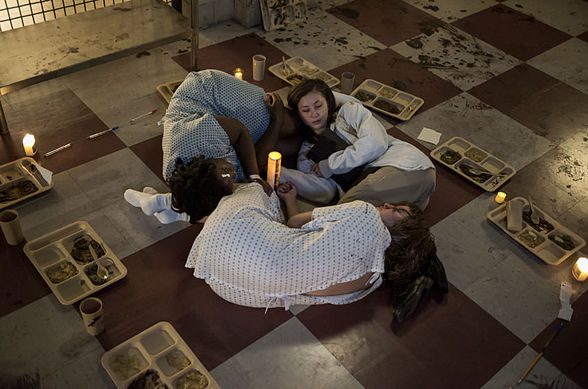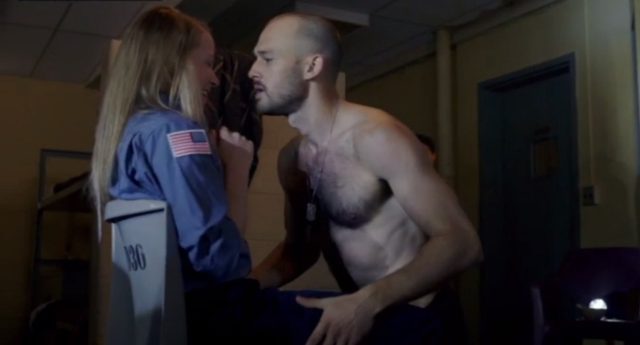In some ways, “Litchfield’s Got Talent” is the most inconsequential episode so far of Orange Is the New Black. In other ways, it feels almost monumental, a very welcome return to form that shows that at its best, Orange can be one of the loosest, funniest shows on the air without compromising the unsettling darkness at its core. This show attempts such a difficult balancing act; when it slips up, it slips up hard, but when it succeeds it feels nothing short of masterful.
“Litchfield’s Got Talent” is light on plot, which works in its favor. The only flashback we see is incomplete, in that we don’t know how its subject wound up behind bars. The flashback concerns Alison, who I find fascinating; now that Poussey is gone, Alison has quietly taken her place as the self-assured, intelligent beating heart of the prison – remember that it was her idea to consult all the inmates for demands, which helped bring them together and potentially stopped a riot from turning into a melee. In the flashback, Alison tells her husband Hassan not to call their daughter Farrah names like “princess”; to instead use empowering words. Alison as a character is a powerful rebuke of Muslim women stereotypes, even as she adheres to tenets of her faith like eating Halal, or the fact that Hassan has another wife. What’s intriguing about the flashback is that we don’t see why Alison ends up in prison. Hopefully Orange picks this up again sooner rather than later.
There’s one aspect of “Litchfield’s Got Talent” that I’m very torn on; even while writing this review I’m not sure how to articulate my reaction. Soso, Kukudio, and Suzanne hear Coates scurrying around in the vents, and Suzanne determines that it’s either “a mischief of rats” or Poussey’s spirit. Soon they’re joined by Taystee, Cindy, and Watson, so they can hold an impromptu seance. On one hand, they all miss Poussey so much that they’re willing to follow Suzanne in her attempt to tap into the afterlife, just so they can speak to her, which is very sweet (as is the argument that Soso and Taystee get into about who knew Poussey best). On the other hand, this kind of impulsive, irrational lunacy is what differentiates Suzanne from Crazy Eyes, who in my estimation are different characters. Suzanne is complex, occasionally childlike in her willingness to believe in that which she can’t see; Crazy Eyes is mentally ill, and the show plays it for laughs. It’s an unfortunate regression for a character who has undergone a frankly miraculous transition since her introduction.
Strangely enough, the best part of this episode is brought on by Taylor and Rice, who I haven’t been the biggest fan of this season. While trying to pants Gloria, they dislodge the gun from her waistband, and after a brief scuffle Rice is in possession of it (“I’m the jeffy now,” she announces). Taylor and Rice are two of the prison’s most unhinged, hedonistic inmates, and they become immediately drunk on power. After lamenting that they can’t “shoot the power back” on so they can watch The Voice, they decide to force the guards to put on a talent show, and thus begins the season’s most sickening, yet strangely hilarious, spectacle so far.
There’s something weirdly apocalyptic about Boo, dressed in a suit, acting as emcee and shouting into a hairbrush, just as there’s something darkly comic about seeing the guards rehearse their various acts: Blake practices magic tricks, Dixon warms up his voice, and Luschek pens an ill-conceived standup bit (sample: “How many of y’all bitches like eating pussy?”). It’s in the talent show, which honestly I didn’t think Orange would be able to deliver on, that the show becomes simultaneously unnerving and hilarious. Major credit is due to director Nick Sandow, Caputo himself, for his keen understanding of what makes these characters work.
The most memorable bit of the talent show is Stratman’s striptease, especially when he zeroes in on Taylor. There’s no menace to his performance, and it’s clear that he never once thinks of using his proximity to Taylor to his advantage. The whole scene feels completely divorced from reality – here’s an inmate in a guard’s uniform, enjoying an intimate striptease from a guard, who at that moment wants nothing more than her approval. In Sandow’s hands, it looks like nothing less than the dissolution of order and civilization. I’m aware of how overwrought that sounds, but Orange is not shy about showing the changing of the guards here (pun unintended). To cap off his act, Stratman yanks a sock off of his penis and throws it to Taylor, who triumphantly lifts it aloft: she owns his manhood now, and him by extension.
Elsewhere, “Litchfield’s Got Talent” gets in some solid character work. Linda is getting some major Stockholm syndrome, enjoying her newfound celebrity status as a judge, and dismissively assuring Piper that she won’t tell anyone about the guard that Alex killed (in a funny touch, it’s revealed that neither Piper nor Alex know Linda’s name, and are referring to her as “von Barlow”). Alex finds herself the de facto leader of a resistance against the riot, despite her protestations (“I’m not a leader; I’m not a good person; I’m a murderer”), which leads to a lovely scene of a group of women laying on the lawn, wordlessly listening to music. And Sophia gets herself thrown into max, in an attempt to see Sister Jane, only to learn that Jane was released from solitary. In a great, wordless moment, played wonderfully by Laverne Cox, Sophia can’t stop herself from laughing, as if she can’t believe her own rotten luck. (It’s also a great callback to one of this show’s most touching friendships; Sophia says “I’m not her, but if I sound like her, I’m flattered.”)
“Litchfield’s Got Talent” is something of a roaring success in the face of what has so far been a somewhat lackluster season. The character work was strong, Sandow’s direction was intuitive and assured, and by allowing the plot to take a backseat, the show allowed its characters to shine through. I’m only dinging it because of the business with Suzanne and Red (who is just getting manic and, frankly, annoying, although I did appreciate the revelation that Piscatella had killed an inmate at his previous posting). But otherwise – goddamn, that was quite an episode.
A Few Thoughts
- I wasn’t crazy about the introduction of the governor, who to the surprise of no one is a huge misogynist, dismissing the riot as “a big ‘take back the night’ rally.” Realistic or not, it just feels lazy.
- I also didn’t like Cindy sitting down for the seance and saying “You wanna pass up some free entertainment?” Cindy, your friend is dead.
- We got to see a very ugly side of Yoga Jones in this episode.
- On the flip side, we got see a very human side to Sankey; she and Alison have more in common than they think, and I’d love it if the show capitalized upon that.
4/5



